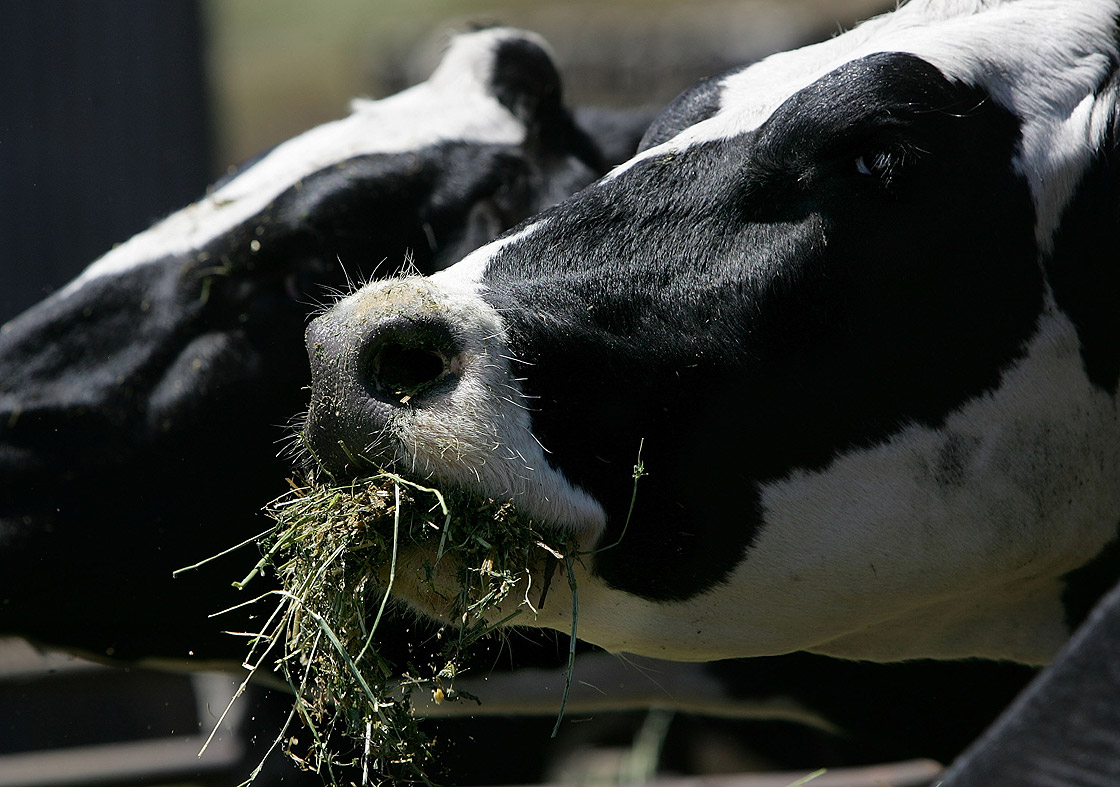TORONTO – The discourse surrounding a new genetically modified crop is heating up.

The National Farmers Union is protesting the possible introduction of genetically modified (GM) alfalfa into eastern Canada, saying the crop jeopardizes the entire organic farming industry.
On Wednesday around 100 protesters gathered in Kitchener, Ont., shouting “no way to GM hay!” as members of the Canadian Seed Trade Association (CSTA) held a workshop to discuss GM alfalfa.
The CSTA is hoping to develop a plan where GM alfalfa and organic alfalfa can coexist.
Full-grown alfalfa is a high-protein feed for pigs, poultry, dairy cows, beef cattle and lambs and is used to increase the nutrients in soil.
In order to be certified organic, foods cannot be produced with genetically modified crops and chemical sprays.
Critics argue that organic crops and GM crops cannot coexist, as cross-pollination of GM alfalfa to organic crops is inevitable – making organic certification impossible.
Phil Woodhouse, president of the National Farmers Union Grey County Local 344 said the CSTA’s claim that it can prevent GM alfalfa from contaminating non GM alfalfa is “utterly absurd.”
But many, including farmers in the U.S. who are already producing GM alfalfa, insist coexistence is possible.
“I have been able to do it, and I think there are a lot of farmers in my area in Washington State who have been able to do it,” said American hay farmer Laura Schlenker.
Coexistence might require the organic farming industry changing their definition of “organic.”
If GM alfalfa is commercialized, “the organic sector may be forced into a situation where they have to change their threshold,” said Rene Van Ackler, professor in the University of Guelph’s department of plant agriculture.
The organic farming industry may have to allow some GMOs in, reversing their current zero tolerance policy.
The crop at the centre of this debate is called “Roundup Ready” alfalfa – Monsanto’s herbicide tolerant, GM alfalfa.
In the U.S., the crop has already been deregulated and is yielding profits.
“Companies that will commercialize the seed, they could do it today,” said Stephen Denys from the CSTA. “What they’re doing however is respecting the needs of the different groups in the marketplace saying ‘okay let’s try and put a coexistence plan together before we bring this to the market’.”
Forage Genetics International is the company that would see the Monsanto-patented crop in eastern Canada.
And to be sure, money plays a huge role in the issue.
One acre of conventionally-grown alfalfa costs $20 to maintain, an acre of GM alfalfa costs around $8 to maintain.
Money lost is also a concern. Canada exports $29-million worth of alfalfa each year, often to countries, such as Japan,
where genetically modified organisms are banned.
In western Canada, alfalfa seeds are largely sold to foreign markets.
“If Roundup Ready alfalfa seed is found, the seed is shipped back at my cost and my contract is cancelled with my European buyers,” said Kurt Shmon, a Manitoba alfalfa seed producer. “I’m done.”
As such, all groups involved agree that no GM alfalfa should be used in western Canada.
East of Manitoba, however, numerous plans are being considered.
One idea for coexistence is to establish a minimum distance between fields. Another would be zoning parts of eastern Canada for GM alfalfa producers, keeping other zones GM-free.
Regardless of what ideas come out of the CSTA workshops, the federal government would have the final say.
“There will be a panel put together, there’s the outline for that already, that will adjudicate whether or not this is in the
best interest of Canada based on scientific investments,” said Agriculture Minister Gerry Ritz.
With files from Global National’s Jennifer Tryon and the Canadian Press
Follow Heather on Twitter @heatherloney


Comments